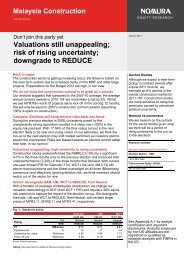Download PDF - ETP - Pemandu
Download PDF - ETP - Pemandu
Download PDF - ETP - Pemandu
Create successful ePaper yourself
Turn your PDF publications into a flip-book with our unique Google optimized e-Paper software.
<strong>ETP</strong> ANNUAL REPORT 2011<br />
14<br />
Agriculture<br />
The Agriculture NKEA looks into transforming the rural<br />
economy. This sector focuses on four key themes to<br />
transform the agriculture industry to agribusiness: ensuring<br />
food security, tapping premium markets, capitalizing on<br />
Malaysia’s competitive edge and expanding participation<br />
in the regional value chain. A total of 16 EPPs have been<br />
identified to deliver RM28.9 billion in incremental GNI and<br />
create 74,600 jobs.<br />
In 2011, the breakthrough achievement is in the introduction<br />
of reimbursable incentives to the anchor companies based<br />
on KPI of work completed and production. This NKEA is<br />
recognized as an enabler which facilitates company growth<br />
and socio-economic development.<br />
To date, the NKEA incentives procedure saw the approval<br />
of 39 companies, with committed private investments of<br />
RM3.2 billion to generate RM10.22 billion in GNI at 2020 and<br />
a cumulative of 31,504 jobs (42 per cent of overall target by<br />
year 2020) by the end of each project’s completion date.<br />
Private investment for EPPs surpassed the original target of<br />
66 per cent to achieve 91 per cent by the end of 2011. This<br />
significantly reduced public investment to nine per cent<br />
from the initial estimate of 34 per cent.<br />
These incentives provided by the government to the anchor<br />
companies are given with a caveat that the surrounding<br />
community of any given project within this NKEA must be<br />
involved and thus benefit economically.<br />
Healthcare<br />
In 2011, Business Opportunity 1 – Medical Devices Industry<br />
was transformed into seven new EPPs, bringing the total<br />
number of EPPs under the Healthcare NKEA to 13. With<br />
these changes, the Healthcare NKEA will contribute to<br />
incremental GNI growth of RM35.5 billion and 181,000 jobs<br />
by 2020.<br />
We have made major policy changes to enable us to<br />
transform Malaysia into a generics export country. The<br />
most significant is the shortening of the compulsory<br />
services for pharmacists from three years to one. They are<br />
also allowed to do their practical training in recognised<br />
private pharmaceutical industry facilities. In addition,<br />
the Pharmaceutical Off-Take Agreement-Government<br />
Procurement for New Local Manufactured Pharmaceuticals<br />
has been agreed upon with implementation in 2012.<br />
We continue to make inroads in healthcare travel. The<br />
Malaysia Healthcare Travel Council, the main care taker has<br />
been corporatized while various tax incentives, automatic<br />
issuance of working permit for spouses of medical<br />
professionals and shorter processing time for healthcare<br />
tourists have been made available. This EPP has generated<br />
RM436 million in revenue.<br />
Competitiveness:<br />
Six structural reforms to ensure changes<br />
In July 2011, we launched six Strategic Reform Initiatives<br />
(SRIs). The SRIs represent policy recommendations made in<br />
the New Economic Model and the cross-cutting reforms to<br />
enable Malaysians to be competitive in the global arena.<br />
Competition, Standards<br />
and Liberalisation<br />
This SRI has made good progress. The Competition Law, to<br />
safeguard against anti-competitive practices and abuse of<br />
market power, came into force in January 2012. In addition,<br />
the Prime Minister has announced the liberalisation of<br />
foreign ownership of banks as well as 17 services subsectors.<br />
These sub-sectors to be liberalised in stages by end<br />
2012 include private hospital services; medical and dental<br />
specialist services; architectural, engineering, accounting<br />
and taxation, legal services; courier services; education and<br />
training services; as well as telecommunication services.<br />
Human Capital Development<br />
The minimum wage is expected to be announced in the<br />
first half of 2012 while the upskilling and upgrading of the<br />
workforce continues. Focus has been given to five sectors;<br />
Oil, Gas and Energy, Tourism, Electrical and Electronics,<br />
Communications Content and Infrastructure, and Business<br />
Services. In addition, the MyProCert programme which<br />
aims to upskill Malaysians to international certification<br />
standards targets to produce 5,000 new certified<br />
professionals by 2014.<br />
Government’s Role in Business<br />
33 companies under six Government Linked Investment<br />
Companies (GLICs) have been identified as ready for<br />
divestment either through a listing, pare-down or outright<br />
sale. Under the plan to rationalise the portfolio of GLCs,<br />
five have been identified for stake pare-downs, seven<br />
for public-listing and 21 for outright sale. For the year of<br />
2011–2012, 24 companies have been identified for the<br />
Government’s divestment exercise. For the year of 2011–<br />
2012, 24 companies have been identified for divestment,<br />
and the divestment process will begin as the shares hit an<br />
agreed-upon strike price.








